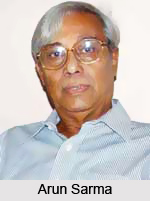 Arun Sarma is the most distinguished and acclaimed contemporary Assamese dramatist. He is also a prominent poet and novelist. All his twelve full-length and three one-act plays display variety in form and content. He was much ahead of his time who had anti-realistic tendencies, with touches of the absurd, symbolism, and allegory. Of them, Sri Nibaran Bhattacharyya in 1967, Purush or `Man` in 1972, Kukurnechia manuh, and Abar or `Food` remain landmarks in modern Assamese theatre. Violence, both mental and physical, can be traced in several Sarma plays. He is not averse to politics either. Buranjipath i.e. `History Lessons` in 1980, Baghjal i.e. `Tiger Trap` and Chinyor or `Scream` in 1984 follow the Marxist path, whereas Anya ek adhyay i.e. `A Different Chapter` in 1995 is a criticism of terrorism. These are relevant to the prevalent terrorist climate in Assam over the last two decades.
Arun Sarma is the most distinguished and acclaimed contemporary Assamese dramatist. He is also a prominent poet and novelist. All his twelve full-length and three one-act plays display variety in form and content. He was much ahead of his time who had anti-realistic tendencies, with touches of the absurd, symbolism, and allegory. Of them, Sri Nibaran Bhattacharyya in 1967, Purush or `Man` in 1972, Kukurnechia manuh, and Abar or `Food` remain landmarks in modern Assamese theatre. Violence, both mental and physical, can be traced in several Sarma plays. He is not averse to politics either. Buranjipath i.e. `History Lessons` in 1980, Baghjal i.e. `Tiger Trap` and Chinyor or `Scream` in 1984 follow the Marxist path, whereas Anya ek adhyay i.e. `A Different Chapter` in 1995 is a criticism of terrorism. These are relevant to the prevalent terrorist climate in Assam over the last two decades.
Dialogue in Sarma`s dramas emphatically establishes their quality as literature. His ability to choose expressive and resonant vocabulary may be directly related to his twenty-nine-year-long career in broadcasting. At first he was a producer and later as station director. He has written forty-two radio plays, inclusive of translations and adaptations, and twenty major documentaries, which attracted national and international recognition. His translation of Sudraka`s Sanskrit Mricchakatika, staged by a Bhramyaman Mancha troupe in 1983, was a trailblazing event for this kind of mobile commercial theatre. Interestingly, although through Sarma`s drama, Assamese theatre attained contemporaneity with world trends in the 1960s, his plays are not as widely performed as they are widely praised.
This article is a stub. You can enrich by adding more information to it. Send your Write Up to content@indianetzone.com




















